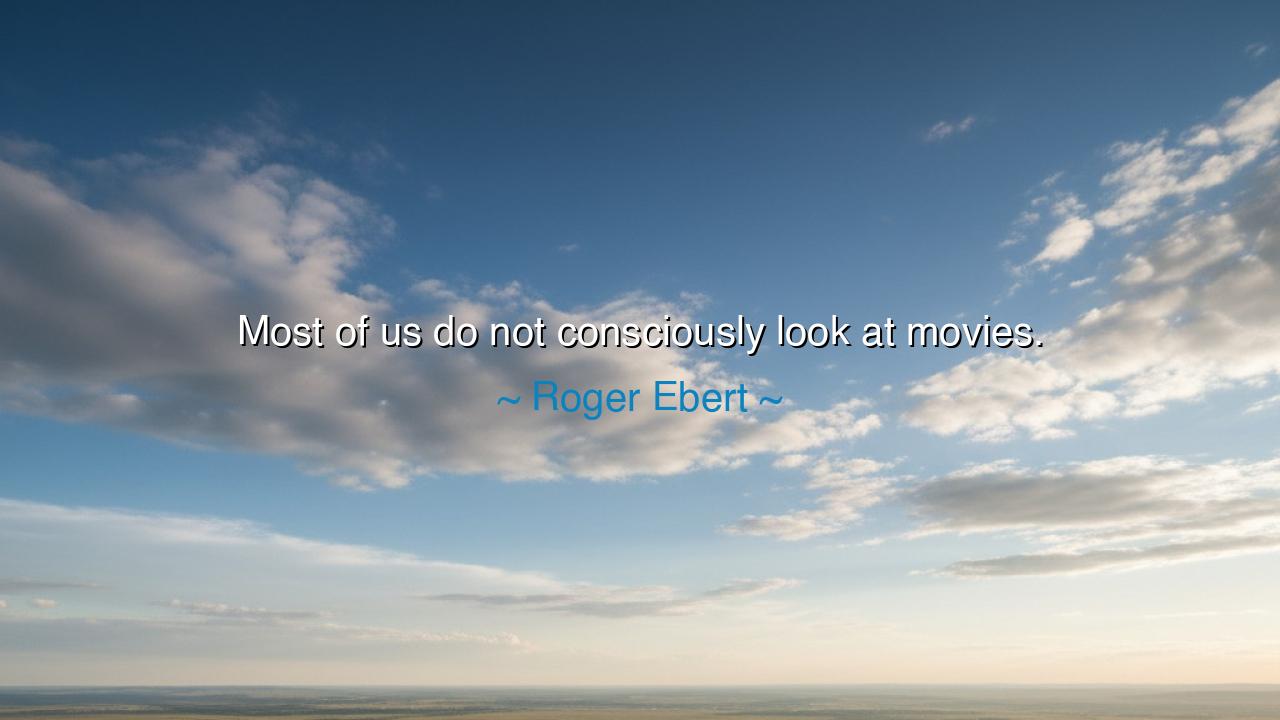
Most of us do not consciously look at movies.






Hearken to the voice of Roger Ebert, sage of the cinema, who proclaimed: “Most of us do not consciously look at movies.” At first the words seem simple, yet they conceal a truth both subtle and profound. For though our eyes are open, we often pass through the world in slumber. We see, yet do not observe; we hear, yet do not listen. Ebert reminds us that to behold a film is not merely to let images wash over us, but to awaken the spirit to meaning, to form, to intention. Without awareness, even the most radiant vision is but shadow passing across a wall.
The act of truly looking is sacred. To look consciously is to pierce the veil, to see not only what is displayed but what lies beneath. A film is more than story—it is rhythm, symbol, light, gesture, silence. When the watcher is passive, these treasures remain hidden. But when the watcher opens both heart and mind, the screen becomes a mirror of life itself. This is what Ebert sought to teach: that cinema, like all art, requires participation, not mere consumption. The passive gaze wastes the gift, while the conscious gaze transforms it into revelation.
Consider the tale of the Renaissance. Many stood before the frescoes of Michelangelo, their eyes admiring color and craft, but only a few saw deeper—into the spiritual battles painted upon stone, into the theology embedded in each curve of muscle and line of shadow. Those few who truly looked carried away not mere memory of paint, but a vision of the human spirit in dialogue with eternity. In the same way, films speak to us, but only those who look with awareness hear their full voice.
To look unconsciously is to be lulled, as sailors by a siren’s song. One floats upon spectacle, dazzled but unchanged. Yet the ancients warned against being enchanted without reflection. For the spectacle is fleeting, but insight endures. A battle on the screen may be thrilling, but to ask why the battle is fought, what it reveals of courage or folly, is to draw nourishment from the tale. Ebert’s words strike against our modern haste, reminding us that art is not fast food, but bread for the soul, to be chewed slowly and savored.
Yet this conscious looking is not only for the realm of cinema. It is the art of life itself. Most do not look at the faces of their loved ones, though they pass them daily. Most do not look at the sky, though it changes with glory each morning and evening. Most do not look at their own lives, drifting as if carried by current rather than steering by will. To truly look is to live awake, and to live awake is to seize the fullness of existence.
The lesson is thus: cultivate awareness. When you watch a film, do not simply ask, “Was it good?” Ask instead: “What did it reveal? What did I feel, and why? What truth, hidden or open, did it speak?” In this practice, you will train your eye and heart to be more alive in all things. Learn to notice the details: the pause before a word, the shift of light across a face, the silence heavier than sound. These are the threads that bind art to life, and life to wisdom.
Therefore, my children of the future, remember this: do not drift through stories as though they were waves upon the shore. Be awake, be present, be conscious. For when you look truly, every film becomes scripture, every story becomes a teacher, every image becomes a flame that lights your path. And as Roger Ebert taught, to learn to look at movies is to learn, at last, to look at life itself.






AAdministratorAdministrator
Welcome, honored guests. Please leave a comment, we will respond soon